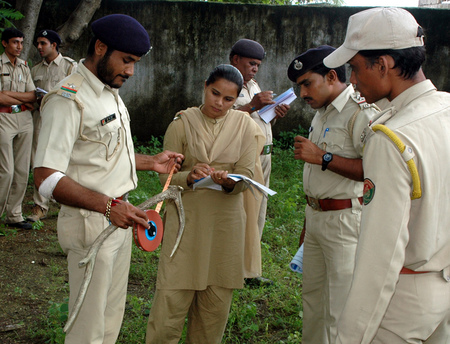Pench Tiger Reserve, May 26, 2014: At least 250 frontline staff deputed to protect wildlife in Pench Tiger Reserve, Madhya Pradesh, will be trained by International Fund for Animal Welfare-Wildlife Trust of India (IFAW-WTI) under their Wildlife Crime Prevention Training programme, in collaboration with the State Forest Department, beginning today.
The training divided into two batches, will continue till June 8. The first batch will concentrate on refresher courses for the frontline forest staff of the Karmajhiri, Gumtara and Kudoi Ranges who underwent the training last year. The second batch, starting June 2, will see fresh training being imparted to the staff of the Pench Tiger Reserve’s buffer area.
“Forest guards are the backbone of India’s wildlife and habitat protection system. They are the guardians of its natural heritage and at the frontline of the fight against poachers and timber smugglers who are sometimes far better armed and equipped. It is thus important that this force remains trained and highly motivated to tackle diverse threats it is being faced with. IFAW-WTI’s training modules aim to supplement the government’s efforts in strengthening staff morale and sharpening their skills,” said Vivek Menon, Executive Director and CEO of WTI and Director of IFAW South Asia.
Pench Tiger Reserve, Madhya Pradesh forms an important part of a conduit in the Central India landscape with its connectivity to Kanha Tiger Reserve in the same state and to Pench Tiger Reserve in Maharashtra. The corridors help establish a key habitat for a considerable population of tigers and other species.
Dr Rajendra Prasad Mishra, Regional Head (Central India) for IFAW-WTI elaborated on the necessity of training in the Reserve saying, “Poaching and illegal trading cases have increased by 10% in Central India and lack of well-trained staff is compounding the problem. This is where the need for such training arises.”
He further added, “Just like last year this training will see crucial theoretical and practical aspects of crime prevention and assessment being conducted such as the nuances of detection, investigation, evidence collection, seizure and preparation of Preliminary Offence Report. Particulars of the Wildlife (Protection) Act, 1972 will also be discussed in connection with the same. In order to practically gauge their understanding by the end of the training, the newly trained staff will be asked to defend ‘cases’ that they have ‘investigated’ during the mock sessions in a moot-court trial held on the last day.”

In a bid to equip and strengthen the frontline forest staff of the country, IFAW-WTI has been conducting Wildlife Crime Prevention Training Programmes, under the Van Rakshak Project (VRP) since 2001. VRP follows a multi-pronged strategy with four thrust areas, abbreviated as TEAM: Training, Equipping, Awareness and Morale Boosting, to broadly facilitate capacity building and strengthen spirits of personnel in tough field circumstances.
As part of its morale boosting initiative, VRP runs the only one of its kind umbrella insurance scheme for forest staff all over India. This unique Group Accident Insurance Scheme provides an insurance cover of up to Rs 100,000 covering over 20000 frontline field staff and their families in case of permanent disability or death while on duty. Over 75 families till date have been assisted and more than 32 families provided with ex-gratia support.